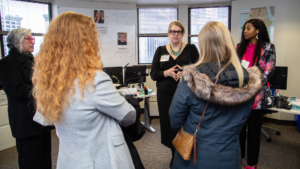The King County Regional Homelessness Authority is seeking input and feedback on a 5-Year implementation plan through multiple engagements with people experiencing homelessness, service providers, elected officials, city human services staff, and coalitions. Below is an overview of the components of the 5-Year Plan that RHA staff are developing and an outline of engagement opportunities available to the community. It should be noted that additional opportunities for engagement will arise this summer, as teams iteratively build their work and learn from community conversations, including surveys, workshops, and working groups.
5 Year Plan Components:
1. Measurable Actions, Outcomes, and Goals
What it is:
This will outline specific goals that the Regional Homelessness Authority (RHA) intends to aim for, the actions and strategies to pursue, and the metrics that will indicate whether or not goals have been achieved.
What it builds on:
This work builds on The Regional Action Framework and the NIS Report, both of which were developed through multiple years of significant community conversations and input. The goals and strategies outlined in those documents provide a basis for the measurable actions, outcomes, and goals component.
Opportunities to engage:
The team will be setting up targeted sessions with the Lived Experience Coalition, King County Youth Action Board Advocacy Organizations, and existing sub-regional tables.
In addition, there will be open workshops in July that will preview goals and strategies and solicit feedback and additional ideas. The intent of these sessions will be to discuss our programmatic investments over time.
Planned sessions:
- Wednesday, July 13th at 12:00-1:00 PM
- Friday, July 15th at 12:00-1:00 PM
- Wednesday, July 20th at 12:00-1:00 PM
- Friday, July 22nd at 12:00-1:00 PM
- Wednesday, July 27th at 12:00-1:00PM
- Friday, July 29th at 12:00-1:00 PM
2. Sub-Regional Planning Activities
What it is:
The RHA Sub-Regional Planning Team has been focused on developing a deep and nuanced understanding of homelessness response and system relationships in the seven sub-regions that exist in King County. This component will include sub-regional analytics inclusive of a landscape of all services that exist in our region for people experiencing homelessness, a funding analysis, and highlighting themes of people’s experiences of homelessness around the region.
What it builds on:
This work builds on the RHA’s deep community engagement that started in Summer 2021 as the team engaged with city partners, people with lived experience of homelessness, service providers, behavioral health providers, libraries, emergency responders, hospitals and community-based organizations. The RHA’s Sub-Regional Planning team has engaged one-on-one with nearly 500 different stakeholders representing about 300 different agencies; additionally the team has been actively engaging in over 20 regional coalition spaces regularly, and co-developing pieces of the funding analysis and the landscape with partners.
Opportunities to engage:
In addition leaning into existing regional tables (see at bottom of page) to engage, the sub-regional planning team is also setting up sub-region specific sessions for system partners. We are working with local partners to set up these workshops to ensure representation of key local partners, if you are interested in learning more please email Alexis Mercedes Rinck.
3. Procurement Processes
What it is:
The RHA Procurement and Capacity Building teams are developing a procurement manual that will outline a more equitable way to procure homelessness services. This will include templates for Requests for Proposals (RFPs) and Requests for Qualifications (RFQs), internal guidance for RHA staff, and a plan for capacity building to support organizations to engage in procurement processes.
What it builds on:
This work builds on extensive community engagement with people with lived experience of homelessness, service provider organizations, and other private and public funders, across the county facilitated by the Capacity Building and Procurement Team, to understand challenges and identify opportunities for equitable improvement.
Opportunities to engage:
The team will host a series of sessions in late July to preview components of the procurement manual and solicit feedback and ideas for improvement. They are hoping to speak with provider staff who are responsible for responding to RFPs/RFQs and engaging in procurement.
Planned sessions:
- Thursday, July 14th at 5:30-7:00 PM
- Thursday, July 21st at 5:30-7:00 PM
- Thursday, July 28th at 12:00-1:30 PM
- Wednesday, August 3rd at 5:30-7:00 PM
4. Terms and Conditions for Contracts
What it is:
The RHA Programs and Performance Team is redesigning the way that contracts are built and managed. Specifically, we will refresh and standardize terms and conditions and redesign the processes for contracting, contract monitoring and management.
What it builds on:
This work builds on the RHA’s assumption of 320 contracts from the City of Seattle and King County on January 1, 2022, which we consolidated down to 202 contracts. It also builds on our ongoing monthly base-building spaces and open hours for program and grants management staff, which focus on identifying pain points within the contracting process and specific programmatic interventions.
Opportunities to engage:
In addition to the existing base-building and open hour spaces, the team is hosting four working sessions targeted at provider staff who engage in contract development, contract management, and program operations. (e.g. program managers, administrative staff, and front-line program staff).
Planned sessions:
Challenges and Opportunities in Contracting and Contract Management
- Tuesday, July 5th at 5:00-6:00 PM
- Thursday, July 7th at 10:00-11:00 AM
- Tuesday, July 12th at 5:00-6:00 PM
- Thursday, July 14th at 10:00-11:00 AM
Challenges and Opportunities in Contract Monitoring
- Tuesday, July 19th at 5:00-6:00 PM
- Thursday, July 21st at 10:00-11:00 AM
- Tuesday, July 26th at 5:00-6:00 PM
- Thursday, July 28th at 10:00-11:00 AM
5. Standards for Data Collection, Monitoring, and Evaluation of Systems and Program Performance
What it is:
The RHA Community Impact team is redesigning the ways in which data is collected, monitored and evaluated across the system. This work will specifically outline internal and external processes and procedures that will enable human-centered data to be routinely collected and evaluated. Additionally, it will redefine the success metrics for each programmatic intervention.
What it builds on:
This builds on years of work on normalizing data collection in HMIS, and expanding the King County customization of that data resource to match local needs. Building on that foundation, the RHA is working toward a more robust data collection mechanism that will result in a region-wide By-Name List. These systems will help us better monitor and evaluate ongoing success in homelessness response across King County.
Opportunities to engage:
We will use a survey to collect information from participants of intervention-specific base-building spaces. In addition, we will host online workshops, which will likely be focused on specific groups of intervention areas to better understand a person-centered approach to success in our service ecosystem. These will take place on:
- Monday, July 18 at 12:00-1:00 PM
- Friday, July 22 at 2:00-3:00 PM
- Monday, July 25 at 12:00-1:00 PM
- Friday, July 29 at 2:00-3:00 PM
6. Continuous Improvement
What it is:
The RHA will outline a feedback framework for continuous improvement that incorporates both quantitative and qualitative data sources, including but not limited to data from programs, system outcomes, community engagement, and the Office of the Ombuds.
What it builds on:
This will be heavily informed by the work of component 5 and lessons learned from over a year of continuous community engagement between the RHA and system partners.
Opportunities to engage:
The continuous improvement framework will first be built internally, and shared in August as a key component of the 5 Year Plan.
7. 6-Year Budget
What it is:
The RHA Administrative Team is producing a budget to accompany the goals, actions and metrics outlined in Component 1. This 6-Year Budget will outline the actual cost of running a Homelessness Response System that can meet current and anticipated needs.
What it builds on:
This work builds on the goals and metrics outlined in Component 1, previous years gaps analyses, and a financial housing gap analysis being conducted over the coming months.
Opportunities to engage:
The 6-Year Budget will be built internally, and shared in August as a key component of the 5 Year Plan.
Existing Community Spaces and Regional Meetings:
In addition to the sessions listed above, RHA staff continues to engage in existing meetings and forums to have conversations with our partners about the 5 year plan.
- Lived Experience Coalition General Body
- Monthly Diversion Base Building Space
- Monthly Regional Access Point Base Building Space
- Monthly Prevention Base Building Space
- Monthly Transitional Base Building Space
- Monthly Youth Programs Base Building
- SKCCH Coalition Senior Leaders Meeting
- Vehicle Resident Workgroup
- High Acuity Workgroup
- Eastside Homelessness Action Committee
- North Urban Human Services Alliance
- South King County Homelessness Action Committee
If you are interested in getting connected to one of these spaces, please email Alexis Mercedes Rinck.
We are also partnering with provider agencies to set up sessions focused on specific communities including but not limited to:
- Black and African Americans
- Families with children
- Survivors of Gender-Based Violence
- Youth Service Providers
- People living with Disabilities
- LGBTQI+



